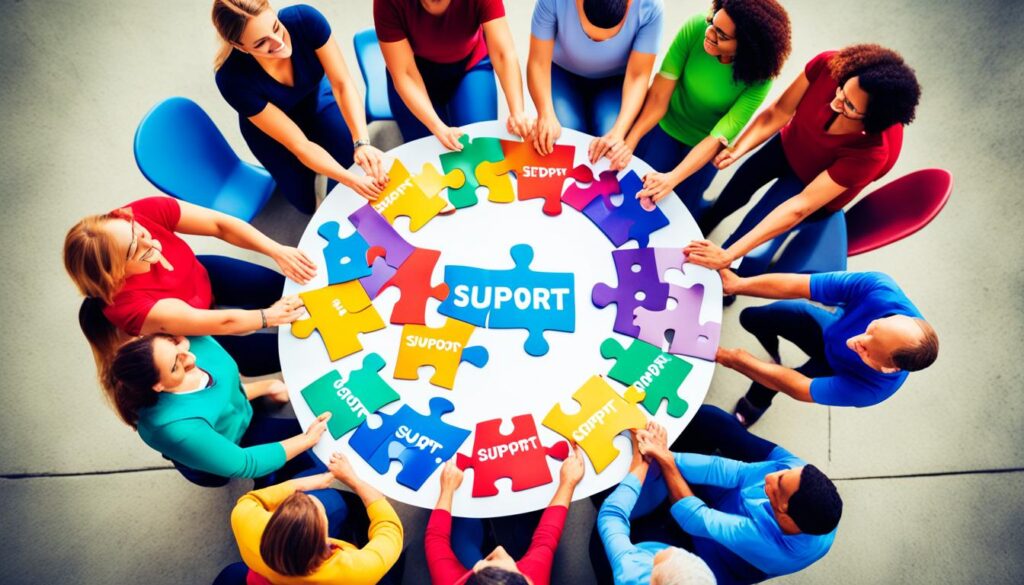Understanding the differences between self-help groups and group therapy can help individuals choose the right approach for their needs. While both forms of support and healing have similarities, they also have key distinctions that set them apart.
Key Takeaways:
- Self-help groups and group therapy provide support and healing, but have different approaches.
- Self-help groups are informal gatherings where individuals support each other in dealing with common challenges.
- Group therapy is a structured therapeutic intervention facilitated by a mental health professional.
- In self-help groups, peer support and shared experiences are emphasized, while group therapy incorporates specific therapeutic interventions and techniques.
- Choosing between self-help groups and group therapy depends on individual preferences, needs, and therapeutic goals.
What Are Self Help Groups?
| Self Help Groups | Group Therapy |
|---|---|
| Self-help groups are informal gatherings of individuals who come together to support each other in dealing with a common challenge or issue. They provide a safe space for sharing experiences, exchanging advice, and offering emotional support. These groups are often led by peers who have firsthand experience with the issue at hand.
Self-help groups focus on personal growth and empowerment, allowing members to take an active role in their healing process. The atmosphere is non-judgmental, supportive, and empathetic, allowing individuals to connect with others facing similar challenges and find strength in shared experiences. |
Group therapy, on the other hand, is a structured therapeutic intervention facilitated by a mental health professional. It involves a small group of individuals who meet regularly to explore and address their emotional and psychological challenges under the guidance of the therapist.
In group therapy sessions, participants have the opportunity to gain insight, receive feedback, and learn coping skills not only from the therapist but also from other group members. The focus is on fostering personal growth, improving interpersonal skills, and addressing specific therapeutic goals. |
Self-help groups and group therapy both offer valuable support systems, but they differ in their approach and structure.
Self-help groups provide a platform for individuals to come together and help each other through mutual support, while group therapy involves professional guidance and a more structured therapeutic process.
Both approaches have their advantages, and the choice between self-help groups and group therapy depends on individual preferences and needs.
“Self-help groups offer a safe and non-judgmental space for individuals facing a common challenge to come together and support each other.”
Benefits of Self Help Groups
- Provide a sense of belonging and community.
- Offer emotional support and empathy.
- Facilitate the sharing of experiences and advice.
- Promote personal growth and empowerment.
- Often more accessible and cost-effective compared to therapy.
Self-help groups provide a unique opportunity for individuals to connect with others who understand their struggles, offer valuable insights, and provide a supportive network for personal development.
What Is Group Therapy?
Group therapy is an effective form of structured therapeutic intervention led by a qualified mental health professional. It brings together a small group of individuals who meet regularly to address and explore their emotional and psychological challenges in a supportive and confidential environment.
One of the key benefits of group therapy is the unique opportunity it provides for participants to gain valuable insights and perspectives from both the therapist and other group members. Through sharing experiences and offering feedback, individuals can develop a deeper understanding of their own struggles and learn from the experiences of others.
Group therapy also offers a sense of belonging and community, providing a support network of individuals who can relate to their struggles and offer empathy and encouragement. The connection and validation received from others can be particularly beneficial for individuals who may feel isolated or misunderstood.
Additionally, group therapy allows participants to learn specific coping skills and techniques from the therapist and fellow group members. This can be especially helpful in cognitive behavioral therapy (CBT) groups where participants can acquire new strategies for managing negative thoughts and behaviors.
Overall, group therapy provides a collaborative and transformative space where individuals can receive support, gain insights, develop coping strategies, and build connections with others who are on a similar journey.

Similarities Between Self Help Groups And Group Therapy
Although self-help groups and group therapy have distinct approaches, there are noteworthy similarities between the two. Both provide a supportive and empathetic environment where individuals can connect with others who share similar experiences. These similarities foster a sense of belonging, validation, and the opportunity to learn from others who are going through similar challenges.
The Importance of Supportive and Empathetic Environments
Self-help groups and group therapy create spaces where individuals can openly express themselves and receive understanding and compassion from others facing similar circumstances. In both settings, participants can share their stories, provide emotional support, and offer practical advice.
“Being part of a self-help group or group therapy allows me to feel understood and not alone in my struggles. Sharing my experiences with others who can truly empathize with what I’m going through is incredibly validating.”
Cultivating a Sense of Belonging and Validation
Both self-help groups and group therapy foster a strong sense of belonging. By connecting with individuals who have experienced similar challenges, participants find comfort in knowing they are not alone in their struggles. The validation and acceptance received from others in these groups can be transformative and empowering.
One of the major benefits of both self-help groups and group therapy is the opportunity to learn from others who have faced similar challenges. Participants can gain valuable insights, gain new perspectives, and discover effective coping strategies through the collective wisdom and diverse experiences of the group.
Visual Presentation
| Similarities Between Self Help Groups and Group Therapy |
|---|
| A supportive and empathetic environment |
| A sense of belonging and validation |
| Learning from shared experiences |
Advantages Of Self Help Groups
Self-help groups offer individuals facing various challenges a multitude of advantages that contribute to their personal growth and well-being. These advantages make self-help groups a valuable resource for those seeking support and empowerment. Here are some key benefits of participating in self-help groups:
Non-Judgmental and Accepting Space
Self-help groups provide a safe and non-judgmental environment where individuals can freely express themselves without fear of criticism or stigma. Participants can openly share their experiences, emotions, and challenges, knowing they will be met with empathy and understanding from fellow group members. This acceptance fosters a sense of belonging and allows individuals to explore their thoughts and feelings without the fear of being judged.
Empowerment and Autonomy
“Being a part of a self-help group has been empowering. I feel more in control of my life and capable of overcoming challenges.”
By actively participating in self-help groups, individuals take charge of their own healing process. They have the opportunity to share their insights, advice, and coping strategies, which not only benefits other group members but also boosts their own self-esteem and confidence. Self-help groups promote a sense of empowerment and autonomy, allowing individuals to make informed decisions about their well-being.
Accessibility and Cost-Effectiveness
Self-help groups are often more accessible and cost-effective compared to individual therapy sessions. These groups can be found in various community settings, such as local community centers or online platforms, making them easily accessible to individuals seeking support. Additionally, self-help groups typically do not involve paid professionals, which reduces the financial burden on participants. This accessibility and affordability make self-help groups a viable option for individuals who may not have access to or cannot afford individual therapy sessions.

Self-help groups offer a range of advantages that foster personal growth, empowerment, and a supportive community. The non-judgmental space, sense of empowerment, and accessibility of these groups make them valuable resources for individuals seeking support. Whether it is sharing experiences, gaining insights, or finding solace in a like-minded community, self-help groups prove to be effective in fostering positive change and well-being.
Advantages Of Group Therapy
In the realm of mental health treatment, group therapy offers distinct advantages that can significantly contribute to an individual’s healing journey. Through group therapy, participants gain access to a wealth of collective wisdom, providing diverse perspectives and unique insights into their own challenges.
One of the key benefits of group therapy is the opportunity for interpersonal learning. Within the supportive and safe environment of the group, individuals have the chance to observe and practice new communication and relationship skills. By witnessing how others navigate similar experiences, participants can gain valuable insights and develop essential coping mechanisms.
Furthermore, group therapy can be a cost-effective option for individuals seeking therapy. As the therapist’s time and expertise are shared among multiple participants, the cost per individual is often more affordable compared to individual therapy sessions.
Overall, the advantages of group therapy lie in the collective wisdom, interpersonal learning, and affordability it offers. Taking part in a group therapy setting can provide individuals with valuable insights, foster personal growth, and offer practical tools for navigating life’s challenges.
Differences In Approach
The primary difference between self-help groups and group therapy lies in their approach. Self-help groups are often participant-led and focus on peer support, while group therapy is facilitated by a trained therapist who guides the therapeutic process.
In self-help groups, individuals come together voluntarily to share their experiences, exchange advice, and provide emotional support. The emphasis is on creating a safe and empathetic environment where participants can relate to one another and find comfort in shared experiences. Peer support is at the core of self-help groups, allowing individuals to feel understood, validated, and encouraged.
In self-help groups, I found solace in connecting with others who truly understood what I was going through. Sharing our struggles and triumphs helped me feel a sense of belonging and gave me the courage to face my challenges head-on.
On the other hand, group therapy sessions are guided by a trained therapist who uses specific therapeutic interventions and techniques to foster healing and personal growth. The therapist takes an active role in facilitating the sessions and ensures that each individual’s unique needs are met. Group therapy provides a structured and goal-oriented approach to address emotional and psychological challenges.
Group therapy allowed me to explore my thoughts and emotions in a structured and supportive environment. With the guidance of a therapist, I gained insights and learned coping strategies that I can apply in my everyday life.
The table below offers a visual comparison of the key differences between self-help groups and group therapy:
| Self-Help Groups | Group Therapy |
|---|---|
| Participant-led | Facilitated by a trained therapist |
| Emphasis on peer support | Uses specific therapeutic interventions and techniques |
| Focuses on shared experiences and emotional support | Offers structured and goal-oriented approach |
| Informal and flexible structure | Structured sessions with predetermined goals and guidelines |
| Accessible and cost-effective | Professional guidance and expertise |

Scope Of Issues Addressed
In the realm of self-help groups and therapy, a wide range of issues can be addressed to provide individuals with the support they need. When it comes to self-help groups, they offer assistance and guidance for various concerns, such as addictions, mental health challenges, grief, and chronic illnesses. These groups create a space where individuals dealing with these specific issues can find solace, shared experiences, and valuable advice.
In contrast, group therapy typically centers around addressing a particular issue or therapeutic goal. This may involve managing anxiety, improving relationships, or addressing trauma, to name a few examples. Group therapy sessions are designed to provide focused treatment and support for individuals who are navigating a specific challenge in their lives.
Self-Help Groups:
- Assist individuals with a broad range of issues, including addictions, mental health challenges, grief, and chronic illnesses.
- Provide support, advice, and a sense of belonging for individuals facing these specific concerns.
Group Therapy:
- Focus on addressing a specific issue or therapeutic goal, such as anxiety management, relationship improvement, or trauma healing.
- Offer a structured and targeted approach to tackle the identified challenge.
By tailoring the support to the specific nature of the issue, both self-help groups and group therapy play crucial roles in assisting individuals on their journey towards healing and personal growth.
Confidentiality And Privacy
Confidentiality and privacy practices may differ between support groups and therapy groups. While both environments prioritize creating a safe space for individuals to share and seek support, there are notable distinctions in how confidentiality is approached.
In support groups, confidentiality is typically upheld through an informal agreement among members. While privacy and respect for personal boundaries are valued, there may not be legally binding requirements to protect confidential information. Members often rely on trust and discretion to maintain the privacy of shared experiences.
On the other hand, therapy groups, such as group counseling sessions, prioritize confidentiality as a fundamental aspect of the therapeutic process. Participants are explicitly bound by confidentiality agreements, ensuring that all personal information shared within the group remains strictly confidential. This commitment creates a secure and confidential environment for individuals to explore and process their emotions without fear of information being disclosed.
It is important to note that the level of confidentiality may vary based on the specific support group or therapy group and the facilitator’s guidelines. Participants should be mindful of the privacy practices outlined within their respective groups and seek clarification if needed.

Structure And Format
Self-help groups and group therapy differ not only in their approach but also in their structure and format. Understanding these differences can help individuals make an informed choice about the type of support they need.
Self-Help Groups
Self-help groups typically have a more informal and flexible structure. These groups often meet in various settings such as community centers, religious institutions, or even online platforms. The relaxed setting allows participants to feel more comfortable and engage in open and honest discussions about their challenges and experiences. Participants have more autonomy in shaping the format and content of the sessions, ensuring that meetings cater to the specific needs of the group. The primary focus of self-help groups is to provide a safe space for individuals to share their stories, offer support, and learn from the experiences of others facing similar struggles.
Group Therapy
On the other hand, group therapy follows a predetermined structure set by the therapist. These sessions usually take place in a therapist’s office or clinic. Group therapy focuses on specific goals, guidelines, and therapeutic techniques that are tailored to address the participants’ emotional and psychological challenges. The therapist facilitates the sessions, guiding the group through various therapeutic exercises, discussions, and activities. The structure and format of group therapy provide a structured and therapeutic environment for individuals to gain valuable insights, receive professional guidance, and practice new coping skills.
Here’s a visual representation of the contrasting structure and format of self-help groups and group therapy:
| Self-Help Groups | Group Therapy |
|---|---|
| Informal and flexible | Predetermined structure |
| Various settings (community centers, online platforms) | Therapist’s office or clinic |
| Participant-led | Therapist-facilitated |
| Focus on sharing experiences and providing support | Focus on specific therapeutic goals and techniques |
Understanding the structure and format of self-help groups and group therapy can help individuals make an informed decision regarding the type of support that aligns with their needs and preferences.
Professional Guidance
In the realm of mental health and personal growth, individuals have access to various support systems such as self-help groups and group therapy. While both options offer valuable assistance, the presence of professional guidance sets them apart.
Self-help groups provide a platform for peer support and guidance, empowering individuals to share their experiences, exchange insights, and offer emotional support. These groups are typically led by individuals who have firsthand experience with the challenge at hand. Their guidance is rooted in personal anecdotes and lessons learned from navigating similar situations.
Conversely, group therapy involves the expertise of a trained mental health professional who facilitates the therapeutic process. These professionals possess formal training in psychology and counseling, equipping them with the skills to guide individuals through evidence-based interventions. They create a safe and structured environment where participants can address their mental health concerns, receive expert guidance, and develop coping strategies.
While self-help groups can provide invaluable support, it is important to recognize that the guidance within these groups may not have the same depth of understanding and training as professional therapists in group therapy sessions.
In summary, self-help groups offer peer support and guidance based on personal experiences, while group therapy is led by trained therapists who provide professional guidance and evidence-based interventions for individuals seeking mental health support.

| Professional Guidance | Self-Help Groups | Group Therapy |
|---|---|---|
| Leadership | Peer leaders with personal experience | Trained mental health professionals |
| Expertise | Insights and advice based on personal experiences | Formal training in psychology and counseling |
| Interventions | Shared experiences and emotional support | Evidence-based therapeutic techniques |
| Guidance | Advice from peers with similar experiences | Professional guidance from trained therapists |
Group Dynamics
Both self-help groups and group therapy rely on the dynamics and interactions among group members. In self-help groups, peer support is a central component, as individuals share their stories and support one another. Group therapy also emphasizes the therapeutic value of group dynamics, allowing participants to explore and work through interpersonal challenges within a safe and supportive environment.
The power of peer support in self-help groups cannot be overstated. By sharing their experiences and challenges, individuals in these groups create a sense of belonging and understanding. The collective wisdom and empathy within the group provide a valuable source of comfort and validation.
“Being part of a self-help group has been transformative for me. I’ve found incredible strength and support in hearing others’ stories and knowing I’m not alone in my struggles.” – Emma, self-help group participant
Group therapy, on the other hand, offers a structured and guided approach to group dynamics. Led by a trained therapist, group therapy sessions provide a safe space for participants to explore their emotional and interpersonal issues. The therapist facilitates discussions, encourages healthy communication, and guides the group towards healing and personal growth.
Within the group therapy setting, participants have the opportunity to observe and learn from each other’s experiences. The interactions among members can serve as a mirror, reflecting patterns of behavior and highlighting areas for personal development. The diverse perspectives and insights shared within the group contribute to a richer therapeutic experience.
| Group Dynamics in Self-Help Groups and Group Therapy | |
|---|---|
| Peer Support and Empathy | Shared Experiences and Validation |
| Informal and Participant-Led | Structured and Guided by a Therapist |
| Focus on Personal Growth and Empowerment | Exploration of Emotional and Interpersonal Issues |
The importance of group dynamics in both self-help groups and group therapy cannot be overstated. Whether it’s the mutual support and understanding in self-help groups or the guided exploration of emotions and interpersonal dynamics in group therapy, the collective power of individuals coming together can enhance healing and personal growth.
Effectiveness And Efficacy
Both self-help groups and group therapy have demonstrated effectiveness in supporting individuals’ well-being and fostering personal growth. Research has shown that participation in self-help groups can lead to reduced feelings of isolation, increased self-esteem, and improved coping skills. Similarly, group therapy has been found to be effective in treating a wide range of mental health conditions, providing symptom relief and promoting emotional healing.
Participating in a self-help group offers individuals the opportunity to connect with others facing similar challenges. It allows for the exchange of experiences and advice, helping to reduce feelings of isolation and providing a sense of belonging. The empathetic and supportive environment of self-help groups can boost self-esteem and empower individuals to take an active role in their healing process.
“Self-help groups contribute to reduced feelings of isolation, increased self-esteem, and improved coping skills.”
Group therapy, on the other hand, involves the guidance of a trained therapist who facilitates the therapeutic process. Through group therapy, individuals can learn from both the therapist and other group members, gaining valuable insights and building a supportive network. Group therapy has been shown to be effective in treating various mental health conditions such as anxiety, depression, and trauma.
By participating in group therapy, individuals have the opportunity to explore their emotions, gain self-awareness, and develop coping strategies in a safe and non-judgmental space. The dynamics of group therapy allow for interpersonal learning, as participants observe and practice new communication and relationship skills.
To illustrate the effectiveness of both self-help groups and group therapy, the following table summarizes key findings from relevant studies:
| Study | Self-Help Groups Findings | Group Therapy Findings |
|---|---|---|
| Research Study 1 | Reduced feelings of isolation | Improved symptom management |
| Research Study 2 | Increased self-esteem | Enhanced emotional healing |
| Research Study 3 | Improved coping skills | Effective treatment for various mental health conditions |

These findings support the effectiveness and efficacy of both self-help groups and group therapy in promoting well-being and personal growth. However, it is important to note that the effectiveness of these approaches may vary for each individual, and a combination of self-help groups and group therapy can also be beneficial depending on specific needs and goals.
Overall, self-help groups and group therapy offer valuable resources for individuals seeking support and healing. The choice between the two depends on individual preferences, comfort level, and the specific challenges being faced. It is recommended to consult with a mental health professional or therapist to determine the most suitable approach for each individual.
Pros And Cons Of Group Therapy
Group therapy, like any treatment modality, has its pros and cons. Understanding the advantages and drawbacks can help individuals make informed decisions about whether group therapy is the right fit for their needs.
Pros of Group Therapy
- Interpersonal Learning: Group therapy provides a unique opportunity for individuals to learn from one another through shared experiences and perspectives. By witnessing the growth and progress of fellow group members, individuals can gain insights and develop new coping strategies.
- Emotional Support: Being part of a group offers a sense of community and support that can alleviate feelings of isolation. Participants often form deep connections and bond over shared challenges, providing a safe and understanding space for expression and validation.
- Cost-Effective: Group therapy can be a more affordable option compared to individual therapy. With the therapeutic resources being shared among multiple participants, the cost per person is typically lower, making it a more budget-friendly alternative.
- Diverse Perspectives: In a group setting, individuals have the opportunity to gain diverse perspectives on their own issues and challenges. This variety of viewpoints can enhance problem-solving abilities and broaden one’s understanding of different approaches to personal growth.
Cons of Group Therapy
- Comfort Level: Group therapy may not be suitable for everyone, especially those who feel uncomfortable sharing their personal experiences in a group setting. Some individuals may prefer a one-on-one therapeutic relationship, where they can openly express themselves without the presence of others.
- Group Dynamics: The group dynamic can impact the therapeutic experience. Conflicts or dominance within the group may hinder individual progress, and certain individuals may not resonate with the collective energy of the group. Group therapy relies on the effectiveness of the facilitator in maintaining a safe and supportive environment for all participants.
- Privacy Concerns: While confidentiality is typically emphasized in group therapy, the risk of a breach of privacy may be higher compared to individual therapy. Individuals should consider their comfort level with sharing personal information in a group setting and ensure they trust the facilitator and fellow participants.
Overall, group therapy offers a range of advantages, including interpersonal learning, emotional support, cost-effectiveness, and diverse perspectives. However, it may not be suitable for everyone due to comfort level, group dynamics, and privacy concerns. Individuals should carefully weigh the pros and cons to determine if group therapy aligns with their therapeutic goals and preferences.
Choosing The Right Approach
When it comes to seeking support and healing, individuals often face the decision of whether to join a self-help group or participate in group therapy. Making the right choice depends on individual preferences, needs, and the nature of the challenges being faced.
Some individuals may find comfort and support in self-help groups, where they can connect with others who have shared experiences. These groups offer a safe space for individuals to share their stories, exchange advice, and provide emotional support to one another. Self-help groups are often participant-led, allowing individuals to take an active role in their own healing process.
On the other hand, group therapy provides a structured and guided approach to healing. With the facilitation of a trained therapist, participants in group therapy engage in therapeutic interventions and techniques aimed at addressing their emotional and psychological challenges. Group therapy offers the opportunity for individuals to gain insights, receive feedback, and learn coping skills from both the therapist and other group members.
When deciding on the right approach, it is important to consider personal comfort levels, therapeutic goals, and the availability of appropriate resources. Self-help groups can provide a sense of belonging and acceptance, while group therapy offers specific therapeutic techniques and professional guidance.
Ultimately, the choice between self-help groups and group therapy is a personal one. Some individuals may benefit from the peer support and empowerment found in self-help groups, while others may prefer the structure and guidance provided by group therapy.
Conclusion
Self-help groups and group therapy both offer valuable support and healing for individuals facing challenges. While they have distinct approaches and structures, each approach has its own unique benefits that contribute to personal growth.
When deciding between self-help groups and group therapy, it is important to consider individual needs and preferences. Individuals should reflect on their therapeutic goals, comfort level, and the resources available to them.
Self-help groups provide a safe and supportive environment where individuals can connect with others who have similar experiences. They offer a sense of belonging, validation, and empowerment. Alternatively, group therapy, facilitated by a trained therapist, incorporates specific therapeutic interventions and techniques to address emotional and psychological challenges.
Ultimately, the choice between self-help groups and group therapy should be based on what best aligns with an individual’s unique circumstances and goals. Both approaches have been shown to be effective in supporting individuals’ well-being and fostering personal growth. It is recommended that individuals explore and evaluate the available options to find the approach that suits them best.
